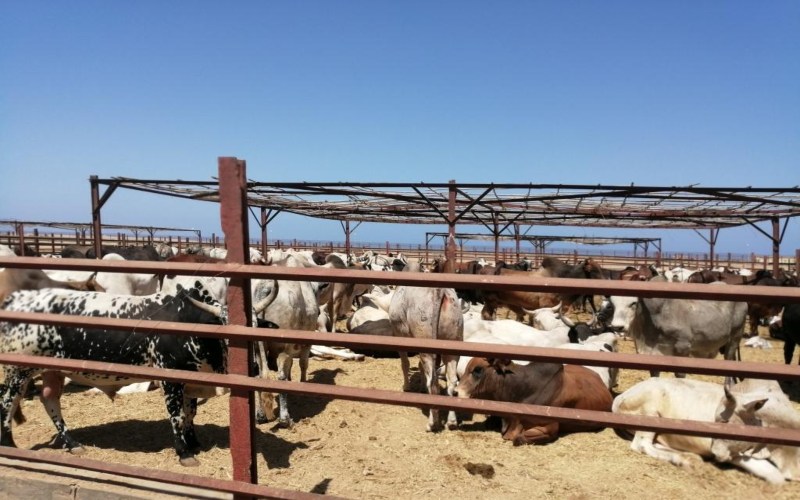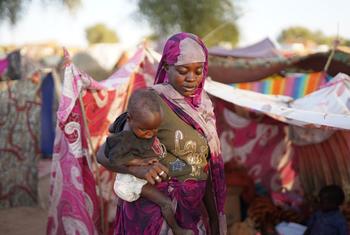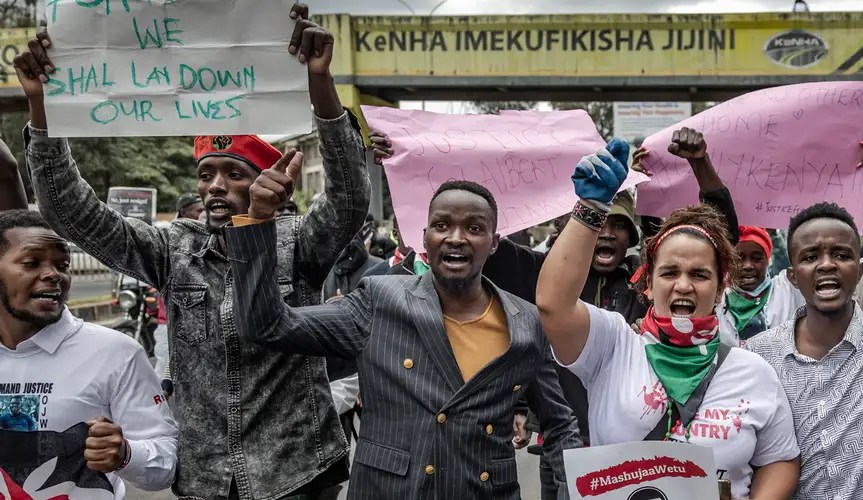Kamukunji's Kiambiu families decry inconsistent demolitions after being left homeless
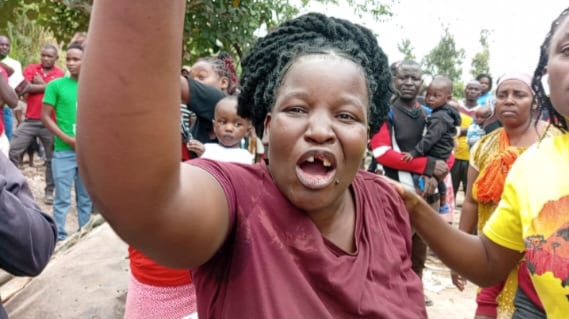
With no source of income, many women have turned to picking up iron sheets and selling them just to put food on the table.
A fresh wave of demolitions in Kiambiu, Kamukunji Constituency, has sparked uproar after one building was left standing despite its proximity to the river.
Residents whose homes were demolished have complained of unfair treatment and inconsistency in the demolitions, after some buildings, such as Palmer Estate in Kiambiu, were left untouched.
More To Read
- Kamukunji's Kiambiu residents flock to free mobile ID registration ahead of voter listing
- Court halts ouster of Nairobi housing chief Lydia Mathia amid eviction row
- Trapped by rains: Nairobi’s flood victims face another season of uncertainty
- Night demolitions leave Nairobi shoe shiners counting losses
- Grim picture of urban safety as 688 unsafe structures flagged in Nairobi
- Over 100 traders of Fedha Stage in Embakasi protest 24-hour eviction notice
But some officers who sought anonymity stated that the building was not demolished due to an alleged court order halting the process. However, residents were given notice to vacate the building.
Immaculate Atieno, a resident who owns land in the area, expressed her frustration over what she termed inhuman demolitions.
"I asked the officers to give me some time to salvage even the iron sheets from the demolished houses, but they refused. Yet, we still see some buildings standing. We want to know why," said Immaculate.
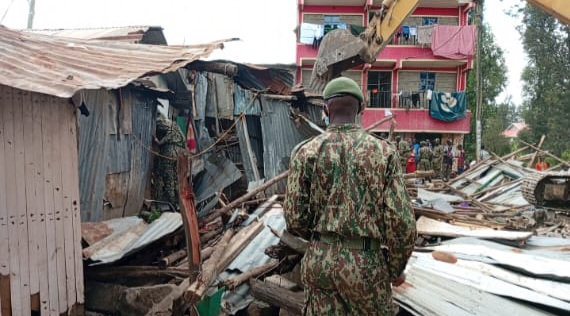 A police officer passes by some of the demolished houses in Kiambiu, Kamukunji Constituency, on June 19, 2024. (Photo: Ahmed Shafat, EV)
A police officer passes by some of the demolished houses in Kiambiu, Kamukunji Constituency, on June 19, 2024. (Photo: Ahmed Shafat, EV)
She further questioned the inconsistencies in the demolition criteria, noting that the 30-meter mark extends further in some areas, while in others, it is less than 30 meters.
"We want to understand what criteria is being used to determine the distance because it seems only poor people have been affected,” said Immaculate.
She highlighted the plight of children who are now forced to sleep out in the cold due to the demolitions, which have left many families in dire straits.
"Today, many children are going to sleep out in the cold. Some went to school and will only come back to their demolished homes. It's very unfair, and the common mwananchi continues to suffer," she added.
Charity Andia, a mother of four, said many residents believed they would not be affected due to the slow pace of the demolitions.
"Where do I start with four children? I don’t have a job or money. I have lived here for 14 years. This is what I can afford, and even during the floods, we were not affected. I don’t understand why it has taken the government so long to come and demolish our home months after the floods," said Andia.
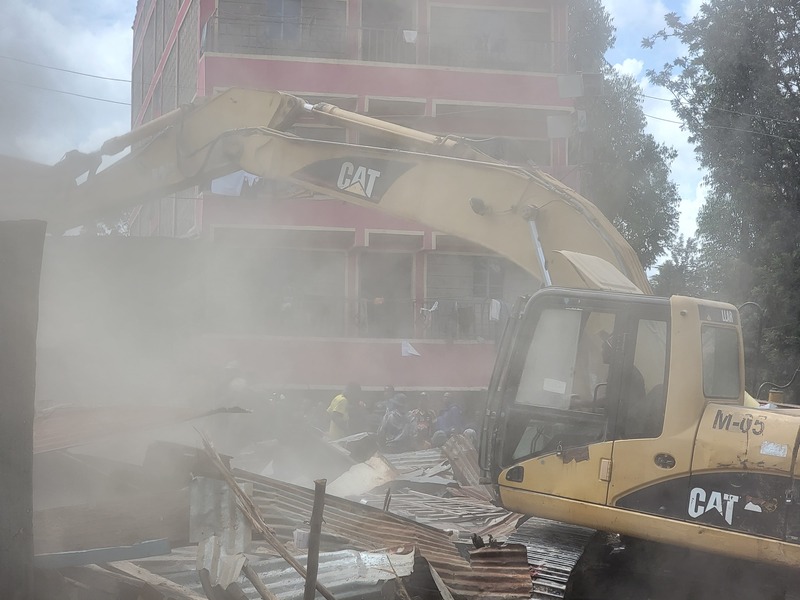 Demolitions of houses in Kiambiu, Kamukunji Constituency on June 19, 2024. (Photo: Ahmed Shafat, EV)
Demolitions of houses in Kiambiu, Kamukunji Constituency on June 19, 2024. (Photo: Ahmed Shafat, EV)
Finding new housing has become a daunting task for the displaced residents. "Now imagine all these people who have been affected. How do you even get a house when everything is looted?" Andia posed.
With no source of income and no home, many women have turned to picking up iron sheets and selling them just to put food on the table.
On Tuesday, houses in Vihiga Estate in Kiambiu, were demolished, leaving many residents, including children, homeless.
Rose Mwanisa, a victim, has been collecting metals ever since to afford a meal for her children."We have nowhere to go. I’m just a regular hustler depending on manual work, and with this setback, I have turned to picking metals to afford even a meal for my children who have not gone to school and are hungry."
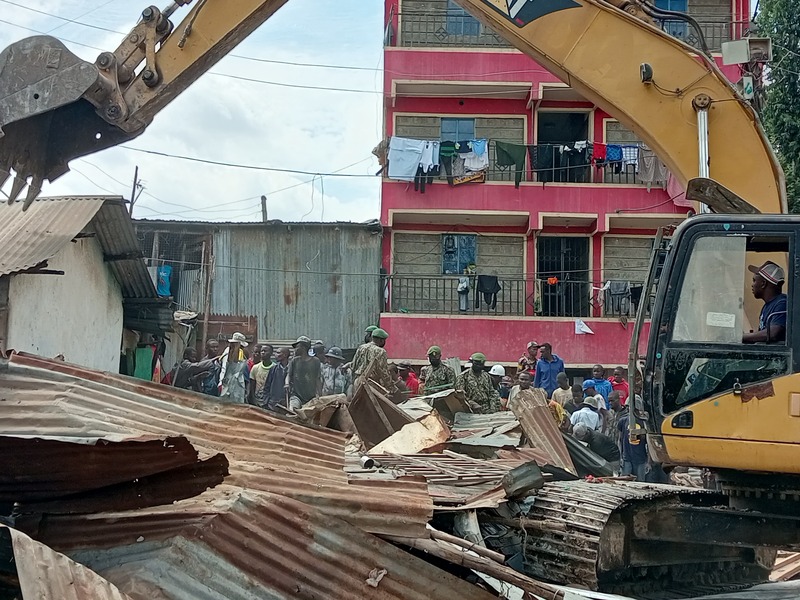 Demolitions of houses in Kiambiu, Kamukunji Constituency on June 19, 2024. (Photo: Ahmed Shafat, EV)
Demolitions of houses in Kiambiu, Kamukunji Constituency on June 19, 2024. (Photo: Ahmed Shafat, EV)
Everything Rose owned was destroyed in the demolition and she is now calling on the government to have mercy on them. "Schools were also demolished, and now we have lost homes and even churches.”
Residents are demanding transparency and fairness as they navigate this challenging situation. They are calling on the authorities to communicate clearly and ensure that the demolitions are conducted impartially.
President William Ruto announced an initiative for displaced households in Nairobi, declaring that each household would receive Sh10,000 to secure alternative accommodation. During his visit to Mathare on May 6, Ruto assured that the government had identified all displaced households and would ensure they received financial assistance for rent over the next three months.
"Every household of the 40,000 households that have been displaced in Nairobi County will be paid Sh10,000 so that they can find alternative accommodation as we plan for their future as a government so that every Kenyan has a home and a place to call home," Ruto stated.
However, weeks later, those affected are yet to receive compensation. Some victims claim they did not provide their names, so they are uncertain about how or when compensation will be done.
Top Stories Today


